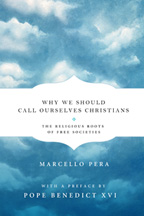Why We Should Call Ourselves Christians: The Religious Roots of Free Societies

Why We Should Call Ourselves Christians: The Religious Roots of Free Societies
Marcello Pera
Encounter Books 2011
The intellectual and political elites of the West take for granted that religion, in particular Christianity, is a cultural vestige, a primitive form of knowledge, a consolation for the weak minded, and an obstacle to peaceful coexistence. We are told that politics must take a neutral stance on religious values, and that societies must hold together without any reference to religious bonds. Liberalism is considered to be “free-standing,” and the Western, liberal, open society is taken to be “self-sufficient.”
In Why We Should Call Ourselves Christians, Marcello Pera reveals that not only is this wrong, it is also dangerous. The very ideas on which liberal societies are based and by which they can be justified—the dignity of the human person, the moral priority of the individual, the view that man is a “crooked timber” inclined to prevarication, the limited confidence in the power of the state to render him virtuous—are distinctively Christian or, more precisely, Judeo-Christian ideas. Take them away and the open society will collapse.
Anti-Christian secularism jeopardizes the identity of the West, leaving it with no conscience. The Founding Fathers of America, as well as major European intellectual figures such as Locke, Kant, and Tocqueville, knew how much our civilization depends on Christianity. “The challenges of our particular historical moment,” as Pope Benedict XVI calls them in the preface to the book, can be faced only if we stress the historical and conceptual link between Christianity and a free society.
Reviews
Marcello Pera’s timely book goes to the heart of the malaise infecting Europe today—the malaise of a civilization built upon Christian values and Christian understandings, which no longer identifies itself clearly as Christian, and whose political class imagines that the secular philosophy of human rights is both an adequate replacement for the Christian faith and without need of a religious foundation. As Pera argues, the ideology of human rights without the Christian heritage falls into disarray and contradiction, and the society of Europe, when it ceases to call itself Christian, ceases to be a genuine society.” — Roger Scruton, Visiting Professor, University of St. Andrews, and Visiting Scholar, American Enterprise Institute
“The American civil rights movement of the 1960s would have been impossible in the absence of Christian support. Analogously, Senator Marcello Pera argues not only that the liberal principles of contemporary Europe derive from Christian roots, but also that invocation of the moral core of Christianity is crucial for the development of the muscular will necessary for securing those liberal principles from external and internal corrosive influences. This book presents a clear and vigorous challenge to political liberalism—the secular ideology that liberal principles can survive and flourish if cut off from their Christian roots. Both Americans and Europeans can profit from reading it with care.” — Michael J. White, Professor of Law and of Philosophy, Sandra Day O’Connor College of Law, Arizona State University